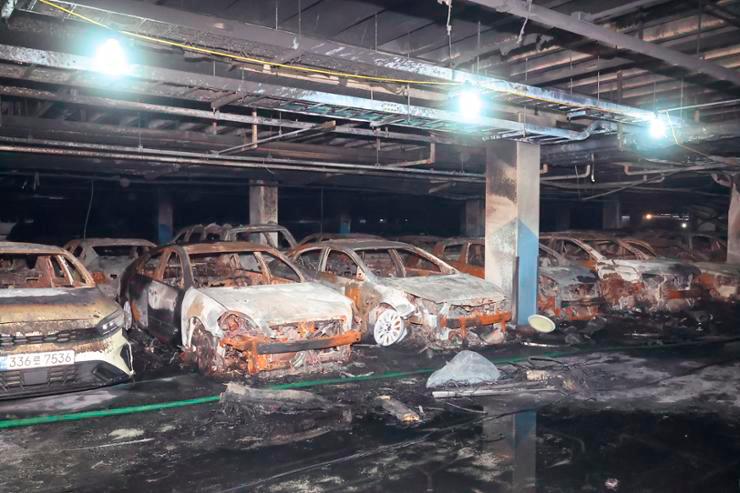MERCEDES-BENZ KOREA is under intense scrutiny following a devastating fire caused by its EQE electric vehicle (EV) earlier this month. The fire, which erupted in an apartment complex parking garage in Incheon, resulted in the destruction of over 40 vehicles and significant damage to hundreds more. The incident has ignited growing public concerns about EV safety and has led to criticism of Mercedes-Benz Korea’s handling of the situation.
Key Issues:
Incident Details: The fire involved a Mercedes-Benz EQE sedan equipped with a battery from China’s Farasis Energy. While the investigation into the exact cause is ongoing, the possibility that the battery was responsible remains a significant concern.
Company Response: Mercedes-Benz Korea has faced criticism for its defensive stance and lack of transparency. Despite deciding to donate 4.5 billion Won to affected residents, the company has not issued a public apology or detailed its countermeasures. It has also been reluctant to disclose information about its battery suppliers, unlike other car manufacturers who have been more open about their sources.
Industry Comparisons: BMW Korea, in response to a previous scandal involving its 520d sedans, issued a recall and public apology swiftly. In contrast, Mercedes-Benz Korea’s response has been perceived as inadequate. Other manufacturers like Audi, Hyundai, and Kia have been more transparent about battery details, contributing to their more favorable public image.
Public and Government Reaction: The fire has led to a peak in public anxiety about EV safety. The South Korean government has held an emergency meeting to address safety concerns and discuss potential regulations. Suggestions include requiring EV manufacturers to disclose battery details and implementing measures to prevent fully charging EVs in certain locations.
Expert Opinions:
Safety Concerns: Automotive engineering professor Lee Ho-geun from Daedeok University criticized Mercedes-Benz Korea for not taking immediate responsibility and addressing the growing public fears. He suggested that the company should have acted more decisively to restore trust.
Regulatory Considerations: Experts, including Professor Kim Dae-jong from Sejong University, argue that carmakers need to focus on enhancing safety monitoring and conduct thorough checks to prevent future incidents. There are calls for regulatory changes to ensure greater transparency and safety in the EV market.
Market Impact:
Sales and Reputation: Mercedes-Benz Korea, which was previously the top-selling import car brand in South Korea, is now facing challenges. Sales figures for 2024 show a decline, allowing BMW Korea to gain market share. The ongoing controversy and perceived mishandling of the incident could further impact Mercedes-Benz Korea’s reputation and market position.
Future Steps:
Company Actions: Mercedes-Benz Korea’s current strategy involves maintaining silence due to the ongoing investigation. However, the company faces mounting pressure to address the situation more transparently and effectively.
Government and Industry Response: The South Korean government and industry officials are considering new regulations and safety measures to address the concerns raised by this incident and to prevent similar issues in the future.
As the investigation continues, Mercedes-Benz Korea’s handling of the situation will be closely watched, with significant implications for its reputation and the broader EV market in South Korea.









